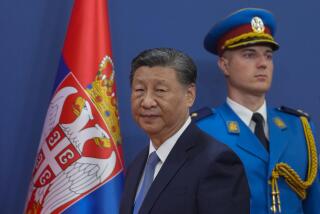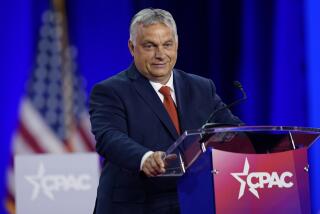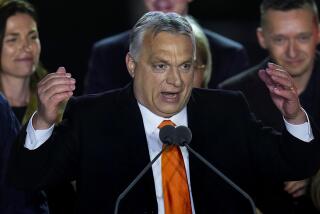NEWS ANALYSIS : Baker Sows Seeds of Hope in 3 East Bloc Nations : Diplomacy: The secretary is heartened by his welcomes. He cautions governments against backsliding.
- Share via
BUCHAREST, Romania — Secretary of State James A. Baker III made the last stop Sunday of his swing through three capitals of Eastern Europe, where he encouraged democratization, raised hopes and heard the frustrations of opposition leaders preparing for the first free elections in 40 years.
Moscow appears to approve the program for change in the region that Baker supported in Prague, Czechoslovakia, his first stop, on Tuesday. He called for free and fair elections and pledged to the democratic nations of Europe, “large and small, to stand by them to resist invasion, intimidation or coercion.”
And he warned that any backsliding on promised democratization would preclude U.S. economic and political help.
He was heartened, aides said, by the welcome of even those governments that he lectured about the dangers of backsliding, for it showed clearly that the United States retains influence in this region despite severe budget constraints in Washington.
But he cannot have anticipated the scope of the obstacles that anti-Communist opposition forces complained have been put in their way by the interim governments of Bulgaria and Romania, which are made up of well-entrenched former Communists.
The governments in all three countries complimented him on his Prague policy statement, U.S. officials said. More importantly, the Soviets also seemed to approve of its main points--or at least did not take exception to them, even though the statement called for free-enterprise economies in what used to be the monolithic Communist Bloc.
Soviet Foreign Minister Eduard A. Shevardnadze told Baker at their first session in Moscow on Wednesday that “there was much he could agree with” in the excerpts he read of Baker’s speech, a senior U.S. official related.
It was after this seeming endorsement that Baker’s additional stops in Bulgaria and Romania were confirmed to reporters traveling with him.
U.S. officials said the Soviet attitude was expected. In the view of Soviet officials, free elections that produce legitimate governments and free-market economies in East Europe would relieve Moscow of the political and financial burdens of its former empire and increase the stability of the countries.
Besides spurring democratization, Baker’s visits signal to the rest of the world that the United States distinguishes among the individual countries and also distinguishes them from the Soviet Union. The effect should encourage businessmen to take a closer look at investment opportunities here, according to Bulgarian officials.
Also, Baker’s warm receptions at the stops, by government officials and by opposition forces, seem to confirm the Bush Administration’s contention that the United States retains clout in the world, even if it cannot provide vast economic aid.
“Too often you hear, on Capitol Hill and elsewhere, that only the bottom line counts,” said one Administration official. “This trip shows at least that we can have leverage without deep pockets.”
Baker did bring economic help to Romania, announcing $80 million in humanitarian food assistance--grain and butter--for the country. But the move only served to underline the fiscal straits in which Washington finds itself. The food was not a gift: The best Washington could do was provide “highly concessionary terms” for repayment.
Any attempt to assess the lasting impact of the trip on the countries is premature. Each country is different ethnically and geographically, and, more important, they are at different stages of political and economic development. The pace of reform is certain to vary.
Czechoslovakia is the most industrialized and experienced in democracy, for example, and its new leaders want technical and managerial assistance, even English teachers, rather than money.
Bulgaria, by contrast, is at the lowest end of the scale, the Portugal of East Europe in terms of income and living standards, democratic traditions and respect for minorities.
Here in Romania, not surprisingly, the transition to democracy has been most contentious and uneven, with an interim government of former Communists who at times have shown they have not forgotten the high-handed ways.
But by his words and presence, Baker brought hope to the opposition leaders that the United States will monitor their progress and represent their grievances. And they affected him.
“They were real live people, not on television, living crummy lives by our standards, who put their lives on the line for their belief in freedom,” the aide said. “It was a very moving experience.”
More to Read
Sign up for Essential California
The most important California stories and recommendations in your inbox every morning.
You may occasionally receive promotional content from the Los Angeles Times.













